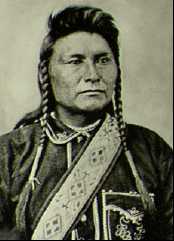I am a firm believer that most historians are wrong when they credit Christopher Columbus for coining the word “Indian” because he thought he was landing his ships in India. In 1492 there was no country known as India. Instead that country was called Hindustan. I think that is closer to the truth that the Spanish padre that sailed with Columbus was so impressed with the innocence of the Natives he observed that he called them Los Ninos in Dios. My spelling may be wrong on the Spanish words, but the description by the padre means something like “Children of God.”
After many years of usage the word Indios emerged and to this day the indigenous people of South and Central America are called Indios. I am told that as the word wound its way North it evolved into “Indian.” Of course some will say that there was a place called the East Indies in 1492 and Columbus may have thought he was headed for that region.
Giago unknowingly parrots Russell Means's argument--or is it the other way around? Either way, they're both wrong.
First, Columbus's goal was China, not India. When he reached the Caribbean islands, he thought they were the islands south of China: the (East) Indies.
Second, the term "India" has been in use much longer than Giago claims. As Wikipedia explains:
Ironically, David Yeagley is closer to the truth on the origin of "Indian" than Giago is. See Yeagley: Liberals Deceive Indians About Name, Spirituality for details.
Giago continues:
I first ran across this sudden change when I was mailed a copy of my weekly column that had appeared in the Lincoln (Neb.) Star Journal. In every place I had used “Indian” the editorial page editor edited it to read “Native.” Of course I was appalled. If I had intended to use “Native” I would have used it and I resented the fact that the EPE had changed the word in order to fit his presumption of political correctness.
I immediately dropped him a note and asked, “When you come across organizational names like National Congress of American Indians or National Indian Education Association are you going to change them to read National Congress of Native Americans or National Native Education Association.”
A few people have written me claiming the correct term is "Native American," not "Indian." I corrected them with arguments similar to Giago's.
I think "Native American" came into use partly because it was "politically correct," but also because it was useful. "Indian" alone causes confusion between "American Indian" and "Asian Indian." It also doesn't include Alaskan Natives. "American Indian" is clear but doesn't include Canadian Indians, Latin American Indians, or Alaskan Natives. "Native American" encompasses all the Natives of the Americas whereas "Indian" or "American Indian" doesn't.
Giago is right that "Native American" causes confusion between people who were born in America and people who have inhabited America since the beginning of recorded history. That's why we use capitalization: to distinguish between native Americans and Native Americans. But "Native American" (or simply Native) remains a useful term for the reasons stated above.
Thus endeth today's lesson in etymology.
Pictured below: A Native American and a native American.



3 comments:
Writerfella here --
writerfella prefers 'Native' to 'Native American,' hands down. Tim can call himself 'Indian' if he so wishes but he should only speak for himself, as does writerfella. And then Tim's gonna go real ape shape when he reads writerfella's short story, "The Last Quest," in an upcoming issue of RED SKIN Magfazine, in which writerfella renames his people "NovaMundians" or New World Man. And Rob, you forgot the Indus Valley civilizations on the subcontinent that are as old as Angkor Wat.
Interestingly, Tim walks the line between 'ignorant' and 'ignoramus.' Someone 'igorant' either doesn't know or doesn't want to know. But an 'ignoramus' simply ignores inconvenient truths...
All Best
Russ Bates
'riterfella'
From a Canadian, "First Nations" is the preferred term, "Native" and "Native American" seem to be preferred to "Indian"; that term is regarded as near-archaic.
Writerfella here --
But that's ONLY if you speak Canadian instead of American.
All Best
RussBates
'writerfella'
Post a Comment